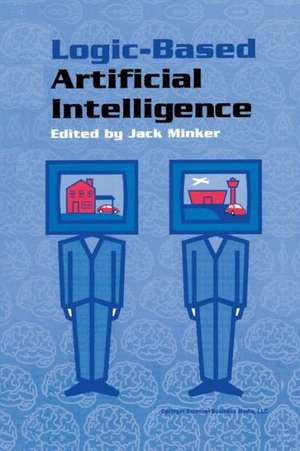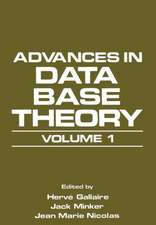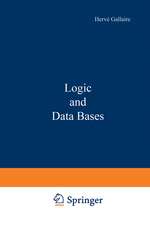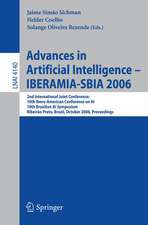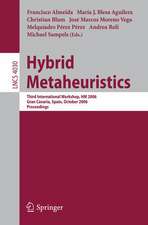Logic-Based Artificial Intelligence: The Springer International Series in Engineering and Computer Science, cartea 597
Editat de Jack Minkeren Limba Engleză Paperback – 9 noi 2012
| Toate formatele și edițiile | Preț | Express |
|---|---|---|
| Paperback (1) | 1396.31 lei 6-8 săpt. | |
| Springer Us – 9 noi 2012 | 1396.31 lei 6-8 săpt. | |
| Hardback (1) | 1402.89 lei 6-8 săpt. | |
| Springer Us – 31 dec 2000 | 1402.89 lei 6-8 săpt. |
Din seria The Springer International Series in Engineering and Computer Science
- 24%
 Preț: 1041.98 lei
Preț: 1041.98 lei - 20%
 Preț: 643.50 lei
Preț: 643.50 lei - 18%
 Preț: 1225.62 lei
Preț: 1225.62 lei - 18%
 Preț: 965.02 lei
Preț: 965.02 lei - 20%
 Preț: 646.12 lei
Preț: 646.12 lei - 18%
 Preț: 948.79 lei
Preț: 948.79 lei - 20%
 Preț: 646.62 lei
Preț: 646.62 lei - 15%
 Preț: 637.46 lei
Preț: 637.46 lei - 20%
 Preț: 643.83 lei
Preț: 643.83 lei - 18%
 Preț: 949.23 lei
Preț: 949.23 lei - 20%
 Preț: 644.48 lei
Preț: 644.48 lei - 20%
 Preț: 994.92 lei
Preț: 994.92 lei - 20%
 Preț: 645.97 lei
Preț: 645.97 lei - 18%
 Preț: 946.87 lei
Preț: 946.87 lei - 20%
 Preț: 995.57 lei
Preț: 995.57 lei - 18%
 Preț: 956.99 lei
Preț: 956.99 lei - 20%
 Preț: 644.98 lei
Preț: 644.98 lei - 15%
 Preț: 649.54 lei
Preț: 649.54 lei - 18%
 Preț: 950.21 lei
Preț: 950.21 lei - 18%
 Preț: 1221.38 lei
Preț: 1221.38 lei - 18%
 Preț: 957.62 lei
Preț: 957.62 lei - 15%
 Preț: 643.99 lei
Preț: 643.99 lei - 18%
 Preț: 948.47 lei
Preț: 948.47 lei - 18%
 Preț: 947.35 lei
Preț: 947.35 lei - 20%
 Preț: 1284.65 lei
Preț: 1284.65 lei - 20%
 Preț: 1628.31 lei
Preț: 1628.31 lei - 20%
 Preț: 1285.78 lei
Preț: 1285.78 lei
Preț: 1396.31 lei
Preț vechi: 1745.39 lei
-20% Nou
Puncte Express: 2094
Preț estimativ în valută:
267.21€ • 290.16$ • 224.46£
267.21€ • 290.16$ • 224.46£
Carte tipărită la comandă
Livrare economică 22 aprilie-06 mai
Preluare comenzi: 021 569.72.76
Specificații
ISBN-13: 9781461356189
ISBN-10: 1461356180
Pagini: 632
Ilustrații: XXIII, 606 p.
Dimensiuni: 155 x 235 x 33 mm
Greutate: 0.87 kg
Ediția:2000
Editura: Springer Us
Colecția Springer
Seria The Springer International Series in Engineering and Computer Science
Locul publicării:New York, NY, United States
ISBN-10: 1461356180
Pagini: 632
Ilustrații: XXIII, 606 p.
Dimensiuni: 155 x 235 x 33 mm
Greutate: 0.87 kg
Ediția:2000
Editura: Springer Us
Colecția Springer
Seria The Springer International Series in Engineering and Computer Science
Locul publicării:New York, NY, United States
Public țintă
ResearchCuprins
I Introduction to Logic-Based Artificial Intelligence.- 1 Introduction to Logic-Based Artificial Intelligence.- II Commonsense Reasoning.- 2 Concepts of Logical AI.- III Knowledge Representation.- 3 Two Approaches to Efficient Open-World Reasoning.- 4 Declarative Problem-Solving in DLV.- IV Nonmonotonic Reasoning.- 5 The Role of Default Logic in Knowledge Representation.- 6 Approximations, stable operators, well-founded fixpoints and applications in nonmonotonic reasoning.- V Logic for Causation and Actions.- 7 Getting to the Airport: The Oldest Planning Problem in AI.- VI Planning and Problem Solving.- 8 Encoding Domain Knowledge for Propositional Planning.- 9 Functional Strips.- VII Logic, Planning and High Level Robotics.- 10 Planning with Natural Actions in the Situation Calculus.- 11 Reinventing Shakey.- VIII Logic for Agents and Actions.- 12 Reasoning Agents in Dynamic Domains.- 13 Dynamic Logic for Reasoning about Actions and Agents.- IX Inductive Reasoning.- 14 Logic-Based Machine Learning.- X Possibilistic Logic.- 15 Decision, Nonmonotonic Reasoning, Possibilistic Logic.- XI Logic and Beliefs.- 16 The Role(s) of Belief in AI.- 17 Modeling the Beliefs of Other Agents.- XII Logic and Language.- 18 The Situations We Talk about.- XIII Computational Logic.- 19 Linear Time Datalog and Branching Time Logic.- 20 On the Expressive Power of Planning Formalisms.- XIV Knowledge Base System Implementations.- 21 Extending the Smodels System with Cardinality and Weight Constraints.- 22 Nonmonotonic Reasoning in???.- XV Applications of Theorem Proving and Logic Programming.- 23 Towards a Mechanically Checked Theory of Computation.- 24 Logic-Based Techniques in Data Integration.
